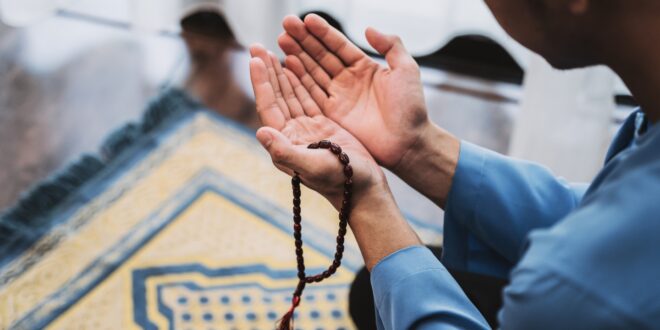Ramadan – the holiest month in the Islamic calendar – is expected to begin this year on Sunday 10 March, depending on the sighting of the moon.
The Islamic calendar follows a lunar one and months begin when the first crescent of a new moon is sighted.
Since the lunar calendar is shorter than the solar year, Ramadan migrates throughout the seasons, coming ten to twelve days earlier each year.
Ramadan, the ninth month in the Islamic calendar, is believed to be the month when the Muslim’s holy book, the Quran, was revealed to Prophet Muhammad.
“Fasting in Islam is not an act of penitence, but a method of self-purification, both physical and spiritual. It also proves as a reminder to remember those less fortunate”
Importance of Ramadan
Fasting during Ramadan is one of the five pillars of Islam, along with the Muslim declaration of faith, daily prayer, charity and performing the Hajj pilgrimage in Mecca.
Muslims see the holy month as a time to spiritually recharge and detach from materialistic desires. They give up food, drink and sex during the daylight hours, and for many, it is an asceticism that brings spiritual elevation and the collective affirmation of faith.
Fasting in Islam is not an act of penitence, but a method of self-purification, both physical and spiritual. It also proves as a reminder to remember those less fortunate.
Charity, a very important part of Islam, also increases significantly during Ramadan as Muslims increase their acts of worship.
The Charity Commission reported in 2016 that British Muslims gave approximately £150 million to charitable causes during the month of Ramadan – that’s £57 a second.
This year for millions of Muslims around the world, Gaza will especially be on their mind, their prayers and their charity focus, as one-quarter of the population faces catastrophic levels of food insecurity and one in six children under the age of two in the north are suffering from acute malnutrition due to Israel’s ongoing brutal war on the besieged enclave.
The Israeli war has killed more than 30,000 people and pushed 85% of the territory’s population into internal displacement amid acute shortages of food, clean water, and medicine, while 60% of the enclave’s infrastructure has been damaged or destroyed, according to the UN.
Who can fast
Muslims around the world fast from sunrise to sunset.
Over the last few years, fasting hours around the world ranged between 9 and 19 hours – with fasting more difficult for those living in countries in the far north, where the sun can remain in the sky almost all day.
Children, the elderly, the sick, women who are pregnant, nursing or menstruating, and people who are travelling are exempt from fasting.
Ramadan traditions
Different cultures around the world celebrate Ramadan differently, but there are a few constants.
Muslims have a pre-dawn meal, called suhur, to keep them going during the day. At sunset, many break their fast the same way Prophet Muhammad did 1,400 years ago, with a sip of water or milk and dates. The post-sunset meal is called iftar.Other acts of worship that increase in Ramadan, include night prayers, known as Taraweeh. Muslims around the world make their way to the mosques after their iftar and spend the evening in prayer together in large groups.
Other cultural traditions include colourful decorations, like the iconic lantern, and fanoos, a tradition that emerged from Egypt during the Fatimid period and spread to other countries in the Arab world.
Muslim-majority countries also employ a mesahrati – someone who walks in the streets before the dawn prayer waking people up from sleep to eat suhur.
When does Ramadan end
Ramadan’s end is marked by Eid al-Fitr, literally, the celebration of breaking fast. The three-day holiday will fall around April 9 this year depending on the start of Ramadan and the moon sighting on the 29th night.
 Eurasia Press & News
Eurasia Press & News




